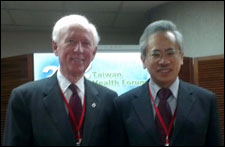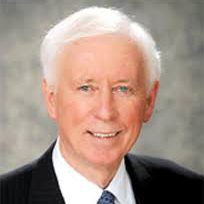Taiwan: Leader in Universal Healthcare Access
Last week’s visit to Taiwan was for me both inspiring and energizing. I have already reported on speaking at the Annual National Doctors Day Celebration. This was followed at the end of my visit by participating in the Annual Taiwan Health Forum.

The Forum is sponsored by the Department of Health and Ministry of Foreign Affairs of Taiwan. It was inaugurated in 2005 and is attended by more than 200 internationally renowned health experts, nongovernmental organization (NGOs) leaders and global public health officials from over 30 countries. This year those attending also included health ministers from Japan, Marshall Islands, Nauru, Palau, Philippines, Solomon Islands, Swaziland, Taiwan and Tuval.
The purpose of the Forum is to serve as a platform for international exchange and cooperation in the Asia-Pacific region. This year’s theme was “Public Health Perspectives in a Changing World”. The goal was to reflect important health issues in the era of globalization. The focus was on bringing knowledge to practice in public health and promoting global partnerships for health.
The perspectives shared by those speaking were expertly presented and enlightening. Participation in discussions by those attending provided valuable insights based on experiences in public health from around the world.
This Forum is another example of leadership in health care by Taiwan that began when it implemented a system of universal access to health care form its citizens in 1995. Prior to that approximately 41 per cent of Taiwanese did not have insurance. These were mostly children, the unemployed and the elderly.
Under the National Health Insurance (NHI) program 99 per cent of Taiwan citizens are now insured. The NHI program includes compulsory enrollment for all citizens and legal residents. It is a single-payer system run by the government. Financing is by a payroll-based premium shared by employee, employer and government. There is a uniform benefits package and modest co-payments are required. Providers are contract-based and currently 92 percent of providers are contracted with NHI. There is a uniform fee schedule under a global budget and premium and copayment subsidies for the disadvantaged.
There is a high level of public satisfaction (85.2 percent) with easy access and no waiting lists. Administrative costs are a low 1.6 per cent. Quality of care as measured by comparison with other Organization for Economic Co-operation and Development (OECD countries is high using indicators such as life expectancy, infant mortality, five-year cancer survival rates and organ transplant survival rates.
Health care expenditures at 6.4 per cent of GDP are low compared with other OECD countries, but Taiwan shares with other countries the experience of an increase in health care expenditures (5.1 per cent) that exceeds the growth of the economy. Feeding this is medical utilization of 14.9 outpatient visits per person and hospital admissions of 14 per 100 persons per year. Currently expenditures under NHI exceed revenues.
To deal with the challenge of rapidly increasing costs the payment system has evolved since 1995 from initially fee-for-service with case payment to the addition of global budgets, pay for performance (P4P), diagnosis related groups (DRG), resource based relative value system (RBRVS) and capitation programs.
Last year the government passed the amended National Health Insurance Act. The act has as its purpose “endeavoring to better respond to the demands of the population and to better accommodate the practical requirements of the program”.
Highlights of this “Second Generation NHI” include:
- Imposing supplementary premiums based on sources of income
- Establishing a mechanism linking revenues with expenditures by consolidating current decision-making bodies
- Diversifying payment schemes to providers
- Public disclosure of important information on decision making meetings, medical care quality, serious rule violators and financial data
Healthcare systems are deeply rooted in each country’s cultural ideas about society and values. Whether one model works for a particular country depends on its goals and values. In other words there is no evidence that one model is better than another, if you do not define what you want to achieve and whom you are willing to trust.
More important than one or the other feature is a national consensus. It’s a question of what values are most important. Is it freedom, choice, social protection or profits? What most economically developed countries have decided is that universal access trumps other considerations.
The path Taiwan took to health system reform is a model for other countries. It began with recognition that lack of health insurance puts people at increased of being sicker and dying sooner. It was based on a commitment to protect the health of the entire population and provide health insurance for every citizen on equal terms. It involved a careful examination of different types of health care systems around the world. From that examination a system was constructed to meet the unique needs of the Taiwanese people.
Welcoming the attendees to the Health Forum Taiwan Health Minister Dr. Wen-Ta Chiu said: “Expansion of health care coverage is important. Progress is slow but the best days are yet to come.”
Considering Taiwan’s record in achieving universal care for its citizens I think there is every reason to share Dr. Chiu’s optimism. I am also inspired and energized!

